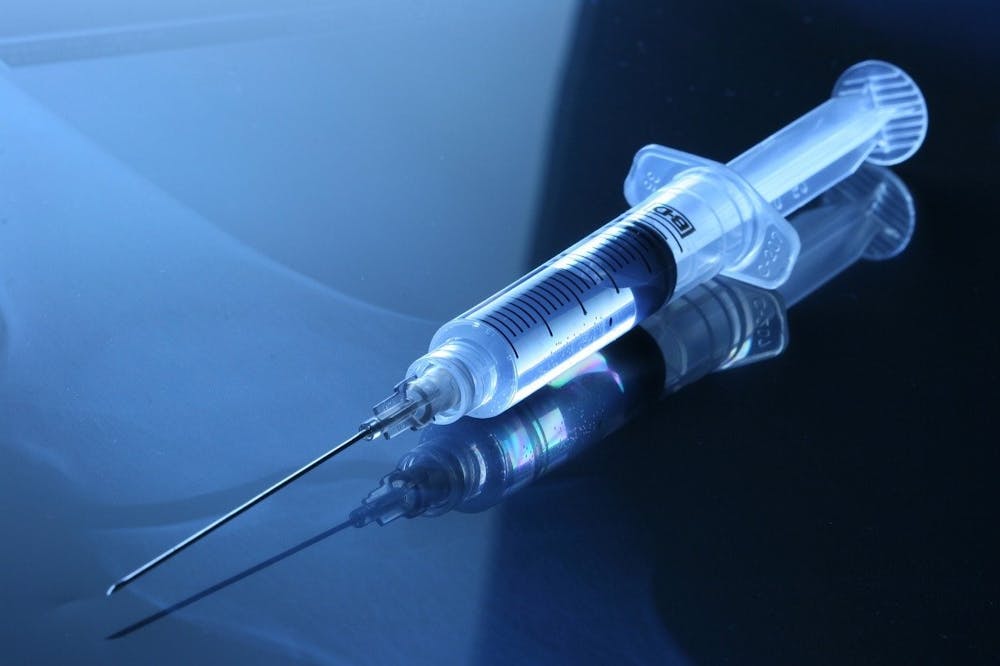A team led by two University faculty members has developed a novel encapsulation technology aiming to help administer more effective and robust vaccines.
A product of Optimeos Life Sciences Inc., a biotechnology company founded by Professor of Chemical and Biological Engineering Robert Prud’homme and Keller Center Entrepreneurship Specialist and Lecturer Shahram Hejazi, the new mRNA technology will rely on inverse flash nanoprecipitation (iFNP), a technique pioneered by the company in 2016.
iFNP encapsulates drugs or biological molecules, including peptides and mRNA, into nano-scale particles that permit increased efficacy and delivery when administered. Incorporating this technology into the COVID-19 vaccine platform would augment the amount of mRNA that can be contained within each administered dose, thus requiring a smaller quantity of mRNA particles and amplifying the vaccine’s immune response.
The current COVID-19 vaccines on the market, including those by Pfizer and Moderna, rely on innovative lipid-nanoparticle mRNA technology that encodes the genetic information of the COVID-19 spike protein. The injected mRNA familiarizes bodies with the spike protein by spurring the creation of antibodies that defend the body against future attacks by the virus.
However, despite the pace of current COVID-19 vaccine production and distribution, as well as the 94 percent efficacy rate documented for the Moderna vaccine, these vaccine technologies have certain shortcomings.
For instance, there are issues of scalability and overactive immune responses. Optimeos’ forthcoming product seeks to improve upon these areas of mRNA vaccine technology.
In an email to The Daily Princetonian, Prud’homme explained the advantages of the iNFP-based mRNA technology relative to the current mRNA vaccines.
“First, we can obtain loadings of mRNA five times higher than in the published Moderna vaccines,” Prud’homme wrote. “This advantage appears not to be needed for the COVID-19 vaccine. However, there are other disease indications, such as those requiring antisense RNA delivery, where the total amount delivered intra-cellularly should make a difference.”
“The other major difference is that our technology does not require cationic (i.e. positively charged) components,” Prud’homme added. “These are required for the current Moderna or Pfizer lipid nanoparticles. These cationic components help activate the immune system and are helpful for vaccines. But they cause an overactive immune response if you try multiple injections.”
Referencing an article that Antonin de Fougerolles, one of the early Chief Scientific Officers of Moderna, penned in regard to the success of the biotechnology company’s COVID-19 vaccine, Prud’homme pointed out that Moderna has struggled to harness its mRNA technology in confronting the challenges of diseases that necessitate multiple injections.
“We rapidly made excellent progress on the mRNA design and chemistry, but the most complex piece scientifically involved the manufacture of pure mRNA and finding the best way to deliver it into cells,” de Fougerolles wrote. “This problem was not unique to us. Several other mRNA companies at the time, notably Curevac and BioNTech, were working in the mRNA space as well, but the field in general was still hampered by inefficient and non-scalable methods to get the mRNA into cells.”
Moderna ultimately made use of lipid nanoparticles in their signature mRNA vaccines, but this technology falls short of the mRNA scalability that Optimeos proposes to implement with the iNFP platform.

Although COVID-19 vaccines elicit ample immune response, other medical conditions would benefit from limited induced immune responses, according to Prud’homme. For example, the iFNP-based mRNA technology would make repeated injections for particular medical conditions feasible without overburdening recipients’ immune systems, which would help the treatment of certain inflammatory diseases and genetic disorders.
In December 2020, the National Science Foundation awarded Optimeos a one-year small business technology grant to help their efforts toward developing efficient iNFP-based COVID-19 vaccines.
According to Prud’homme, it may not be long before Optimeos can demonstrate the value of its technology.
“We expect to have a demonstration of the effectiveness of our encapsulation technology for mRNA in the next few months,” Prud’homme wrote. “Optimeos is in collaboration with two major pharmaceutical companies for RNA applications of our nanoparticles.”








